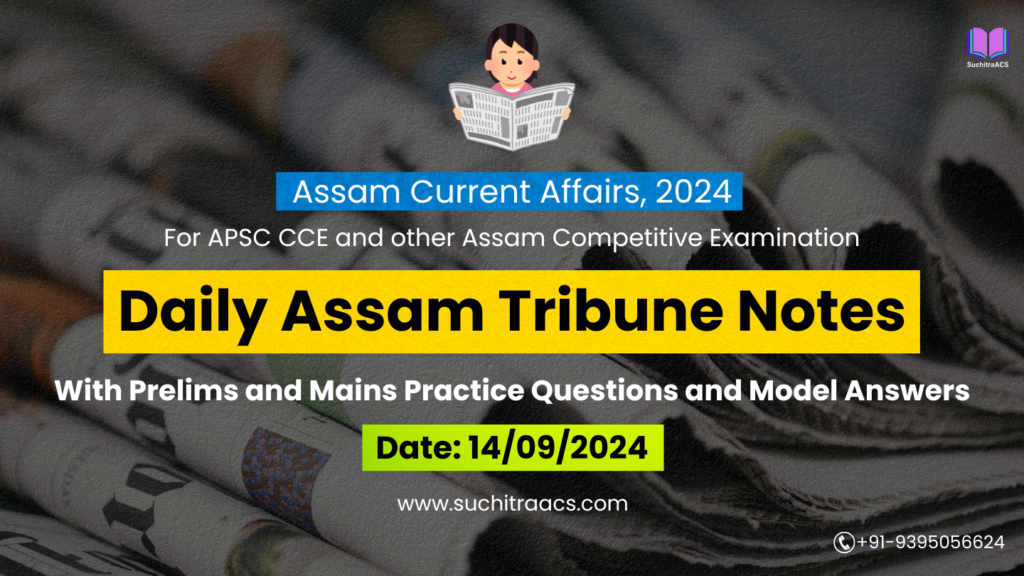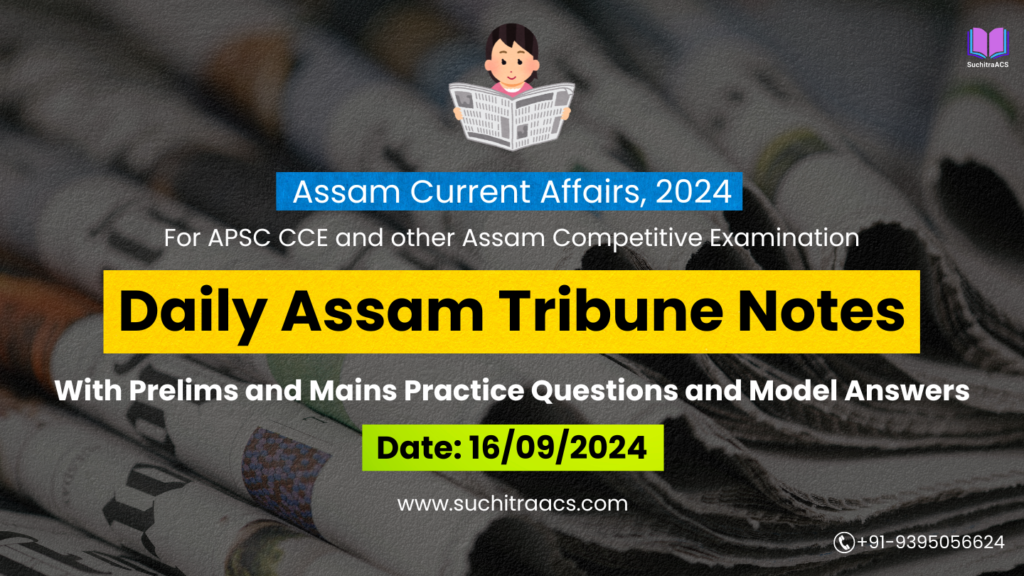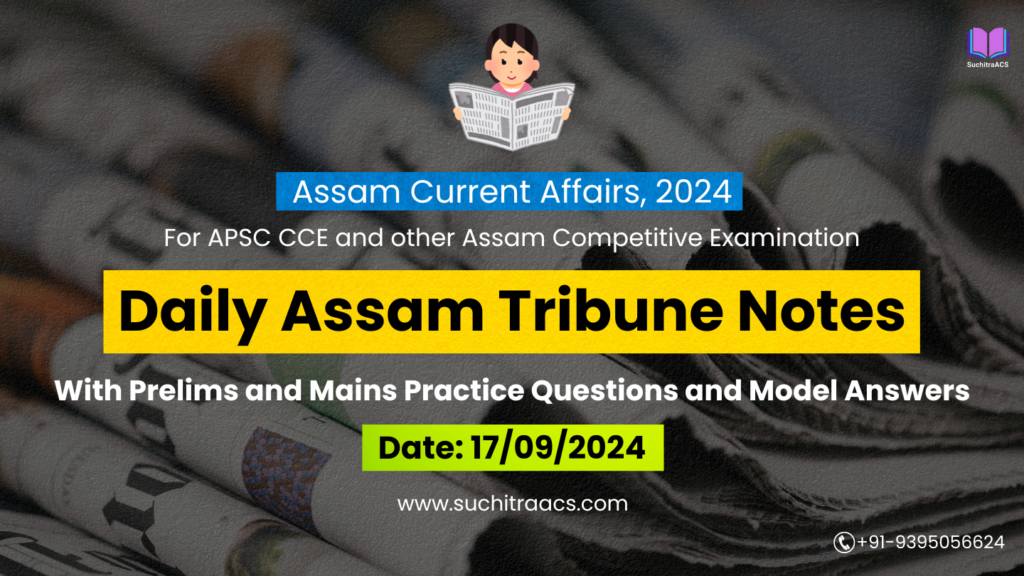I. Economy of Assam
Palm Oil Cultivation in Assam:
The Assam government is promoting palm oil cultivation to reduce edible oil imports and achieve self-sufficiency. This initiative covers 18 districts, including Barak Valley, and provides financial assistance and technical training to farmers and youth.
- Target Areas: The government has targeted 1,500 hectares in Cachar district.
- Benefits: Palm oil cultivation will reduce import dependence, create employment opportunities, and contribute to Assam’s agricultural and economic development.
Infrastructure Development in Tezpur:
- Water Supply Project: A mega water supply project worth ₹32.37 crore has been launched, aiming to provide clean drinking water to 6,000 households in two years.
- Other Projects: An auditorium and beautification projects for Padum Pukhuri and Barpukhuri are also planned, enhancing Tezpur’s infrastructure and quality of life.
Financial Inclusion in Underserved Areas:
- NEDFi’s Business Correspondent Model: Deployed in remote areas of the Northeast to improve access to credit for small borrowers.
- Impact: Rs 127 crore has been disbursed, supporting small enterprises, with zero NPAs, showcasing successful loan repayments.
- Significance: The initiative promotes financial inclusion and economic empowerment in remote areas, reducing dependence on informal money lenders.
II. Biodiversity, Environment, Security, and Disaster Management
Environmental Sustainability at Sonapur College:
- Green Belt Development: In collaboration with Jubilant FoodWorks Ltd and the Pollution Control Board of Assam (PCBA), Sonapur College is developing a 4,000 sq. ft. green belt using the Miyawaki method.
- Benefits: Improved air quality and biodiversity, serving as a model for sustainable practices.
Violence During Eviction Drive in Sonapur:
- Incident: A violent clash in Kachutoli during an eviction drive led to two deaths and 22 injuries. Resistance from illegal settlers escalated the situation.
- Concerns: The incident raises the need for better conflict resolution during such operations, emphasizing law and order while addressing land encroachment.
III. Political and Administrative System of Assam
APSC Cash-for-Job Scam:
- Chargesheet Filed: The SIT has charged 23 officers under various sections of the IPC and the Prevention of Corruption Act.
- Significance: This reinforces the government’s commitment to fighting corruption in public services and sends a strong message against malpractices.
MCQs Based on Assam Tribune (13/09/2024)
1. Which statements are correct about palm oil cultivation in Assam?
(i) The initiative aims for self-sufficiency in edible oil.
(ii) It covers 18 districts.
(iii) The government provides financial aid and technical training.
(iv) Cachar district is a major focus.
Options:
(A) (i) and (ii) only
(B) (i), (ii), and (iii) only
(C) (ii) and (iv) only
(D) All of the above
Answer: D
2. The Tezpur water supply project aims to:
(A) Provide potable water to 6,000 households within two years.
(B) Build an auditorium with 1,000 seats.
(C) Beautify Padum Pukhuri and Barpukhuri.
(D) All of the above
Answer: A
3. NEDFi’s business correspondents in underserved areas aim to:
(A) Support large-scale infrastructure projects.
(B) Provide formal funding to areas with limited bank access.
(C) Increase bank branches in remote areas.
(D) Promote tourism.
Answer: B
4. The violent clash in Sonapur during an eviction drive:
(A) Resulted in two deaths and 22 injuries.
(B) Occurred due to resistance from illegal settlers.
(C) Led to the deployment of additional security forces.
(D) All of the above
Answer: D
5. The 117th birth anniversary of Prasad Singh Subba was observed at:
(A) Amdara, Jamugurihat
(B) Nagaon Govt Girls’ HS School
(C) DKD College, Dergaon
(D) District Library Auditorium, Guwahati
Answer: A
APSC Mains Question
Q. Discuss the challenges and opportunities associated with promoting palm oil cultivation in Assam. Analyze the government’s initiatives and suggest measures to ensure sustainable growth.
Model Answer
Palm oil cultivation is a significant initiative to reduce India’s edible oil imports. Assam is at the forefront of this effort, with the government offering financial support and technical training. However, challenges such as land availability, market volatility, and environmental concerns must be addressed to ensure sustainable growth.
Challenges:
- Land Availability: Finding suitable land without disrupting existing agricultural practices.
- Initial Investment: High start-up costs discourage small farmers.
- Environmental Impact: Possible effects on biodiversity and water resources.
Opportunities:
- Import Substitution: Reduces foreign dependence on edible oils.
- Income Generation: Potential for higher yields and better incomes for farmers.
- Employment: Increased job opportunities in agriculture and related sectors.
Government Initiatives:
- National Mission on Edible Oils (NMEO-OP): Financial assistance for planting and intercropping.
- Assam Agribusiness and Rural Transformation Project (APART): Infrastructure support for palm oil regions.
Measures for Sustainable Growth:
- Land Identification: Proper allocation of suitable land.
- Market Development: Local market mechanisms for fair pricing.
- Environmental Safeguards: Sustainable farming practices to protect biodiversity.
Conclusion
Palm oil cultivation presents a significant opportunity for Assam to achieve self-reliance in edible oil production and boost its agricultural economy. By addressing the challenges and leveraging the opportunities through effective government policies and sustainable practices, Assam can ensure the long-term growth and prosperity of this sector.
✨ Looking for top-quality APSC online coaching at an affordable price?

🔔 Join Our WhatsApp Study Group!
For exclusive access to premium quality content, including study materials, current affairs, MCQs, and model answers for APSC CCE and other Assam competitive exams.
Click here to join: SuchitraACS Study WhatsApp Group




